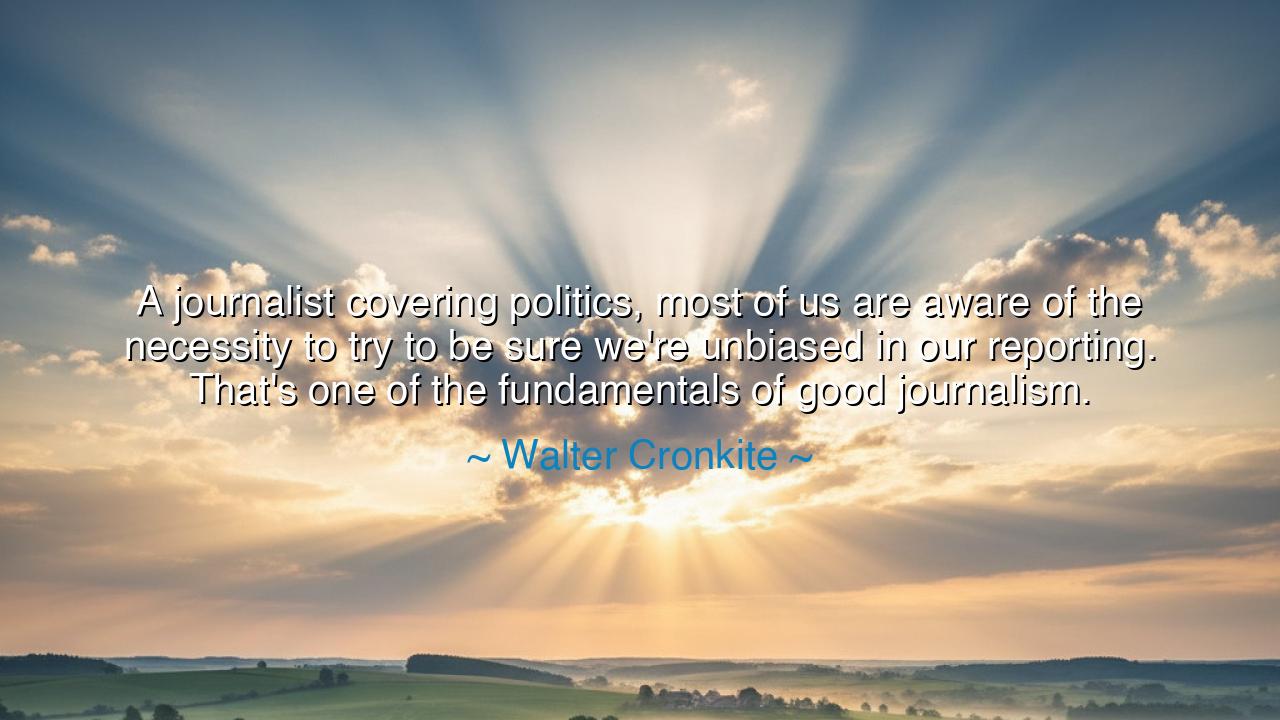
A journalist covering politics, most of us are aware of the
A journalist covering politics, most of us are aware of the necessity to try to be sure we're unbiased in our reporting. That's one of the fundamentals of good journalism.






The words of Walter Cronkite stand as a pillar of his craft: “A journalist covering politics, most of us are aware of the necessity to be sure we’re unbiased in our reporting. That’s one of the fundamentals of good journalism.” Here he names the sacred duty of the press—not to inflame factions, nor to serve the ambitions of power, but to stand as witness, impartial and steadfast, in the turbulent storms of public life. To be unbiased is not to be without heart, but to guard truth from the distortions of prejudice.
Cronkite himself, hailed as “the most trusted man in America,” understood that the strength of democracy rests upon the people’s ability to trust the voice that carries them news. During the Vietnam War, his sober and measured reporting helped shape public perception, not through rhetoric or partisanship, but through clarity and honesty. When he declared that the war seemed unwinnable, it was not an opinion thrown carelessly, but a careful judgment, born of evidence and duty. His words were trusted precisely because his audience knew his commitment to fairness.
History has long shown what happens when journalism abandons impartiality. In the days of Rome, when Caesar and Pompey contended for mastery, pamphlets and speeches—early forms of propaganda—flooded the streets, poisoning discourse and inflaming division. The truth was buried beneath partisan voices, and the republic collapsed into empire. Cronkite’s warning, therefore, is timeless: without unbiased reporting, the people cannot see clearly, and without sight, liberty falters.
Yet the task of unbiased journalism is no easy one. It requires humility—the willingness to step aside from one’s own passions—and courage, for truth often displeases both rulers and mobs. To serve as a journalist in politics is to walk a narrow ridge between competing storms, armed only with integrity. It is a task akin to the priesthood of truth: not to please, but to reveal.
So let the future generations remember: the fundamental duty of journalism is not to sway but to illuminate, not to divide but to inform. A people cannot govern themselves if their knowledge is poisoned, but with truth set before them, they may judge rightly. Cronkite’s words endure as a commandment: let the journalist be a mirror, not a mask; a servant of truth, not of faction. For upon this rests not only the honor of the craft, but the very survival of freedom itself.






TT36. Vu Thanh Tam
Walter Cronkite’s point about unbiased reporting being a fundamental aspect of good journalism is important, but it makes me think about how bias can be subtle. Even if journalists strive to remain neutral, how do they ensure that their reporting doesn’t reflect subconscious biases? How do journalists navigate the fine line between being impartial while still providing a clear, well-rounded perspective on political issues, especially when complex topics are involved?
Zzyyy
Cronkite's assertion about the importance of unbiased reporting raises an important question about journalism’s role in modern society. In an age where the lines between fact and opinion are often blurred, how can journalists ensure they’re presenting politics without bias? Is it enough to simply present the facts, or should reporters be actively involved in clarifying the context around those facts to prevent manipulation by political interests?
NNHong Ngoc Nguyen
I admire Walter Cronkite’s view that unbiased reporting is fundamental to good journalism, especially when covering politics. However, with the increasing polarization of media outlets, I wonder if true neutrality still holds value. Is the demand for unbiased journalism becoming unrealistic in an era where media companies often serve specific political agendas? How can journalists stay committed to neutrality when the public has such strong partisan divides?
LLynh
Cronkite’s quote speaks to the cornerstone of good journalism: impartiality. But is it possible for reporters to remain unbiased when politics is inherently subjective? What does it mean to be unbiased in a field where every story can be interpreted differently depending on one's perspective? Can journalists truly cover politics without their own personal views influencing their work, or is it inevitable that some bias will always exist in political reporting?
CNChi Nguyen
Cronkite's commitment to unbiased reporting is a standard many journalists strive for, but in today’s media landscape, it’s harder than ever to maintain that ideal. With the rise of social media and 'news' outlets with clear political leanings, can true objectivity ever be achieved? Or are we simply fooling ourselves into believing that journalism can be entirely neutral? Is there a way to preserve journalistic integrity in an increasingly polarized world?